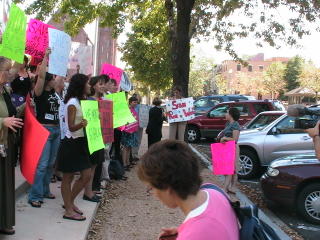My mother called me last night incensed by George Will's op-ed in the Sac Bee. Both my mom and I have the guilty pleasure of respecting Will's columns from time to time. In fact, once when my mom and I were driving back from Dulles, we heard him interviewed on C-Span, and he used the phrase "low emotional metabolism" to describe men born before WWII. I love that phrase.
Anyway, I finally brought myself to read this, after regrouping from our lobby experience.
Here is a sample:
[Obama] might, however, care to note three not-at-all recondite rules for avoiding poverty: graduate from high school, don't have a baby until you are married, don't marry while you are a teenager. Among people who obey those rules, poverty is minimal.
Will uses these three "rules" to build this specious argument:
Liberalism's post-Katrina fearlessness in discovering the obvious — if an inner city is inundated, the victims will be disproportionately minorities — stopped short of indelicately noting how many of the victims were women with children but not husbands. Released during the post-Katrina debacle, scant attention was paid to the National Center for Health Statistics' pertinent report that in 2003, 34.6 percent of all American births were to unmarried women. The percentage among African-American women was 68.2.
Given that most African-Americans are middle class and almost half live outside central cities, and that 76 percent of all births to Louisiana African-Americans were to unmarried women, it is a safe surmise that more than 80 percent of African-American births in inner-city New Orleans — as in some other inner cities — were to women without husbands. That translates into a large and constantly renewed cohort of lightly parented adolescent males, and that translates into chaos, in neighborhoods and schools, come rain or come shine.
What Will doesn't actually say, although clear his argument implies clearly that Single, poor Black mothers who give birth are to blame for inner city chaos and crime. So, to refresh your minds, here is what Dan Quayle said back in 1992:
Right now the failure of our families is hurting America deeply. When families fall, society falls. The anarchy and lack of structure in our inner cities are testament to how quickly civilization falls apart when the family foundation cracks. Children need love and discipline. A welfare check is not a husband. The state is not a father. It is from parents that children come to understand values and themselves as men and women, mothers and fathers.
And for those concerned about children growing up in poverty, we should know this: marriage is probably the best anti-poverty program of them all. Among families headed by married couples today, there is a poverty rate of 5.7 percent. But 33.4 percent of families are headed by a single mother are in poverty today.
Nature abhors a vacuum. Where there are no mature, responsible men around to teach boys how to become good men, gangs serve in their place. In fact, gangs have become a surrogate family for much of a generation of inner-city boys. I recently visited with some former gang members in Albuquerque, New Mexico. In a private meeting they told me why they had joined gangs. These teenage boys said that gangs gave them a sense of security. They made them feel wanted, and useful. They got support from their friends. And, they said, "It was like having a family." "Like family" - unfortunately, that says it all.
The system perpetuates itself as these young men father children whom they have no intention of caring for, by women whose welfare checks support them. Teenage girls, mired in the same hopelessness, lack sufficient motive to say no to this trap.
Answers to our problems won't be easy. We can start by dismantling a welfare system that encourages dependency and subsidizes broken families. We can attach conditions - such as school attendance, or work - to welfare. We can limit the time a recipient gets benefits. We can stop penalizing marriage for welfare mothers. We can enforce child support payment.
Ultimately, however, marriage is a moral issue that requires cultural consensus, and the use of social sanctions. Bearing babies irresponsibly is, simply, wrong. Failure to support children one has fathered is wrong. We must be unequivocal about this.
It doesn't help matters when prime time TV has Murphy Brown - a character who supposedly epitomizes today's intelligent, highly paid, professional woman - mocking the importance of a father, by bearing a child alone, and calling it just another "lifestyle choice."
What bothers me about this argument strategy, besides the old tactic of "blaming the victim," is that it is so simplistic.
Will (and Quayle) both assume that there is equality of opportunity in the United States. They also assume that the plight that these African American mothers find themselves in is the result of immoral choices, chosen from a full range of possibilities available to them. Sure, in a perfect world, with no Racism, with access to excellent education and jobs, with affordable healthcare, a woman who raises a child in poverty, because she is too lazy or too immoral to provide well for her child, can be judged and condemned. But, we don't live in that world.
I still don't understand why conservative males think that a "father" is what keeps families out of poverty. That only holds if the father makes more money than the mother, which isn't always the case among African Americans. I also don't understand what is so magical about fathers that they are the ones capable of raising well behaved, honorable, and polite sons and daughters. It is also fathers who beat their wives, who hurt their children, and/or who abandon their families. And, so, if the single mothers of the world were married to them, the single best thing they could've done for their kids was to remove them from any access to their father.
There are plenty of other well-supported arguments that could be made, which would explain the reason why inner cities are ravaged by crime and chaos. To blame this all on single mothers, with no mention of, nor upbraiding of the men who impregnated these women, is just plain mean.








